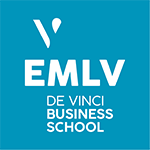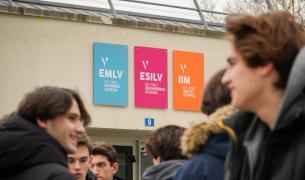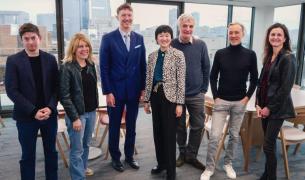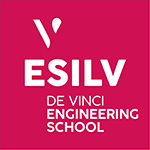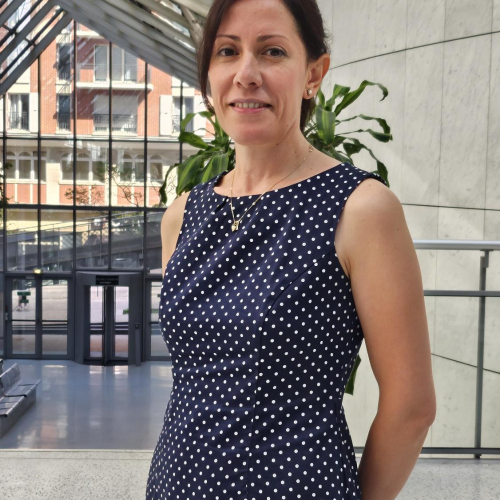
Duygu Turker has a M.Sc. on Social Environmental Sciences/ Ankara University, M.B.A./ Dokuz Eylul University. She received a Ph.D. in Public Administration from Dokuz Eylul University. During her Ph.D., she visited University of Oslo as a guest researcher with the scholarship of Research Council of Norway. She worked at Yasar University between 2004-2023. Her research interests include corporate social responsibility, sustainability, applied ethics, entrepreneurship, and interorganizational relations. As the recognition of her scientific contributions, she was listed in Stanford University's List of World's Top-Cited Scientists in 2020 and 2023. She works as an Associate Professor at Management and Strategic Innovation Department/ EMLV Business School (De Vinci Higher Education).
Ozge Can; Duygu Türker
Institutional pressures and greenwashing in social responsibility: reversing the link with hybridization capability Article de journal
Dans: Management Decision, vol. 63, no. 1, p. 187-216., 2025.
@article{can_3151,
title = {Institutional pressures and greenwashing in social responsibility: reversing the link with hybridization capability},
author = {Ozge Can and Duygu Türker},
url = {https://www.emerald.com/insight/content/doi/10.1108/MD-10-2023-1790/full/html},
year = {2025},
date = {2025-01-01},
journal = {Management Decision},
volume = {63},
number = {1},
pages = {187-216.},
abstract = {Purpose
Despite the ongoing scholarly interest in greenwashing, it is not well known the impact of multiple institutional pressures on greenwashing in corporate social responsibility (CSR). Following the institutional logics perspective, this study investigates how three distinct logics - commercial, public, and social welfare - drive greenwashing and whether organizational capability for blending diverse CSR expectations reverses this link.
Design/methodology/approach
The current study conceptualized and tested an original model on how three institutional logics influence greenwashing in CSR, with the mediation effect of hybridization capability as a response to logic plurality. Partial least squares structural equation modeling was performed on a survey data, which was collected from 150 middle managers in Turkey.
Findings
The results show that while commercial logic has no direct or indirect impact on greenwashing, public and social welfare logics drive greenwashing in CSR. However, these effects are reversed when the CSR hybridization capability increases.
Practical implications
This study contributes to the understanding of what predicts CSR greenwashing by integrating a comprehensive theoretical framework involving multiple institutional logics, conflicting stakeholder demands, and organizational hybridity.
Originality/value
To the best of our knowledge, this is the first study that theoretically and empirically analyzed how the exposure of multiple external pressures affects the CSR greenwashing and how it can be reversed by CSR hybridization capability. This capability mitigates the threats and challenges of multiple logics and turns them into an opportunity to gain legitimacy in the eyes of stakeholders by preventing greenwashing.},
keywords = {},
pubstate = {published},
tppubtype = {article}
}
Gizem Aras BEGER; Bayram Bilge SAGLAM; Duygu Türker
Leveraging corporate sustainability through responsible innovation: Capacity building with exploration and exploitation Article de journal
Dans: Creativity And Innovation Management, vol. 32, no. 4, p. 617 - 635, 2023.
@article{beger_2474,
title = {Leveraging corporate sustainability through responsible innovation: Capacity building with exploration and exploitation},
author = {Gizem Aras BEGER and Bayram Bilge SAGLAM and Duygu Türker},
url = {https://onlinelibrary.wiley.com/doi/abs/10.1111/caim.12576},
year = {2023},
date = {2023-12-01},
journal = {Creativity And Innovation Management},
volume = {32},
number = {4},
pages = {617 - 635},
abstract = {The growing literature on corporate sustainability suggests its positive implications for organizations and stakeholders. Based on the social identity approach, the current study aims to investigate whether responsible innovation can leverage these sustainability advantages of companies to improve organizational commitment and competitiveness. Responsible innovation has been integrated into an original model as a construct that translates corporate sustainability into organizational outcomes to meet stakeholders' needs and to frame and solve the sustainability-related tensions in an ethical way. The study also attempts to examine the mediating impacts of exploration and exploitation orientations on the proposed link between corporate sustainability and responsible innovation. The model was validated by using the partial least squares structural equation modelling method on a sample of 196 middle managers in small businesses in Turkey. The findings reveal that responsible innovation has a significant mediation effect on the proposed links, and both exploration and exploitation elicit the innovation capacity in sustainability practices. The study also supports the argument on the positive impact of exploitation on exploration.},
keywords = {},
pubstate = {published},
tppubtype = {article}
}
Duygu Türker; Ozge Can; Gizem Aras Beger
How Authenticity of Corporate Social Responsibility Affects Organizational Attractiveness: Ideological Perspective Article de journal
Dans: Corporate Social Responsibility And Environmental Management, vol. 30, no. 4, p. 1680-1697, 2023.
@article{turker_2704,
title = {How Authenticity of Corporate Social Responsibility Affects Organizational Attractiveness: Ideological Perspective},
author = {Duygu Türker and Ozge Can and Gizem Aras Beger},
url = {https://onlinelibrary.wiley.com/doi/10.1002/csr.2444},
year = {2023},
date = {2023-07-01},
journal = {Corporate Social Responsibility And Environmental Management},
volume = {30},
number = {4},
pages = {1680-1697},
abstract = {Despite the impact of ideologies on corporate social responsibility (CSR), little is known whether the authenticity of CSR can be assessed in the face of ideological tensions. Following cognitive dissonance and attribution theories, this study investigates the impact of CSR authenticity, which is conceptualized as a function of (1) the ideological fit between company and its CSR initiative and (2) the perceived motive of an ideologically distinct initiative, on organizational attractiveness. Findings of a survey on 253 respondents reveal that while both dimensions of CSR authenticity affect organizational attractiveness, the fit between company and its CSR has a higher effect than does the social motive of CSR. Moreover, positive attitudes toward the CSR initiative as well as the company itself both mediate these relationships. The study shows taking an ideological perspective in authenticity is a relevant approach to understand CSR in the politically polarized contexts of most countries.},
keywords = {},
pubstate = {published},
tppubtype = {article}
}
Narin Bekki; Duygu Türker
Measuring Sustainability of Suppliers: Strategies for Competing Institutional Logics Article de journal
Dans: Journal Of Cleaner Production, vol. 360, p. 132226, 2022.
@article{bekki_2705,
title = {Measuring Sustainability of Suppliers: Strategies for Competing Institutional Logics},
author = {Narin Bekki and Duygu Türker},
url = {https://www.sciencedirect.com/science/article/pii/S0959652622018315?via%3Dihub},
year = {2022},
date = {2022-08-01},
journal = {Journal Of Cleaner Production},
volume = {360},
pages = {132226},
abstract = {While the growing literature has examined the strategies of buyers to ensure the sustainability of suppliers, the underlying theoretical dynamics and measurement of such strategies have been overlooked. Drawing on institutional logics perspective, this study develops and tests a measurement model of sustainable supply chain strategies. The study identifies three theoretically-driven strategies as performance-oriented strategy for commercial logic, risk avoidance-oriented strategy for public logic, and collaboration-oriented strategy for social-welfare logic. Then, a measurement construct is developed through the review of extant literature and corporate practices as well as using the findings of a semi-structured interview with 21 managers in nine suppliers. The construct is tested based on a survey data drawn from a sample of 131 suppliers of Western companies in Turkey. The analysis confirms a three-dimensional measurement model. Considering the importance of knowing how to strategically approach a supplier to ensure its sustainability, both scholars and managers can use this model to investigate the implications of formulation and implementation of diverse sustainability strategies at supply chain context.},
keywords = {},
pubstate = {published},
tppubtype = {article}
}
Duygu Türker; Y.Serkan Ozmen
Understanding How Social Responsibility Drives Social Innovation: Characteristics of Radically Innovative Projects Article de journal
Dans: European Journal Of Innovation Management, vol. 25, no. 3, p. 680-702, 2022.
@article{turker_2706,
title = {Understanding How Social Responsibility Drives Social Innovation: Characteristics of Radically Innovative Projects},
author = {Duygu Türker and Y.Serkan Ozmen},
url = {https://doi.org/10.1108/EJIM-08-2020-0314},
year = {2022},
date = {2022-04-01},
journal = {European Journal Of Innovation Management},
volume = {25},
number = {3},
pages = {680-702},
abstract = {Abstract
Purpose
This study aims to analyze how corporate social responsibility (CSR) initiatives address sustainability challenges by focusing on the congruence between process and outcome variables of CSR.
Design/methodology/approach
Following a theory-driven model, a content analysis was conducted on 63 award-winning social responsibility projects.
Findings
The study reveals that the adoption of a proactive approach during environmental assessment, which manifests itself in a focus on emerging sustainability challenges with a deeper interest, affects the centrality of social responsibility initiative by increasing its learning and partnership potential and leads organizations to produce radical innovations.
Practical implications
The findings provide a valuable understanding for practitioners on organizing the decision making process of CSR initiatives in order to unlock its learning potentials.
Social implications
Radically innovative projects with their higher levels of proactivity, centrality and generalizability are better than incremental ones at transferring and integrating company resources and capabilities to address emergent sustainability challenges.
Originality/value
The impact of CSR on society and nature has been a neglected area of literature. To reduce this gap, this study analyzes how the configuration of process variables shapes the outcomes of socially responsible initiatives on sustainability. It also provides a new typology on the relevance of CSR initiatives to company mission/model that can show how CSR can unlock organizational learning and innovation potentials.},
keywords = {},
pubstate = {published},
tppubtype = {article}
}
Duygu Türker; Y.Serkan Ozmen
How Do Social Entrepreneurs Develop Technological Innovation? Article de journal
Dans: Social Enterprise Journal, vol. 17, no. 1, p. 63-93, 2021.
@article{turker_2707,
title = {How Do Social Entrepreneurs Develop Technological Innovation?},
author = {Duygu Türker and Y.Serkan Ozmen},
url = {https://doi.org/10.1108/SEJ-05-2020-0034},
year = {2021},
date = {2021-02-01},
journal = {Social Enterprise Journal},
volume = {17},
number = {1},
pages = {63-93},
abstract = {Abstract
Purpose
The present study attempts to analyze how social entrepreneurs (SEs) develop technological innovation in the face of diverse institutional logics, which are embedded in the National Systems of Innovation (NSI).
Design/methodology/approach
Based on the content analysis of Ashoka Fellows, the study compares SEs in developed and developing countries, which represent strong versus weak NSIs.
Findings
SEs selectively couple the elements of diverse institutional logics to ensure the resource inflow and legitimacy of their operations. However, SEs particularly at weak NSIs are also decoupling their profit and non-for-profit branches to address conflict among diverse logics. Moreover, the study finds that 12 out of 20 entrepreneurs who identify themselves as technologically innovative did not develop any new technological innovation.
Practical implications
The study shows that being technologically innovative depends on the acquisition of resources and the management of legitimacy challenges, SEs can diversify their innovations by creating more incremental, architectural and modular innovations to address competing demands among logics.
Social implications
The study reveals that SEs in weak NSIs interact with multiple institutional logics more frequently than their counterparts in strong NSIs. Although this context leads them to diversify their technological innovation, there is a need for improving the NSIs of SEs in developing countries to facilitate the continuity of resource inflow and ensure the legitimacy of their operations.
Originality/value
Integrating two complementary theoretical lenses, the study contributes to the literature by exploring the impact of the interaction between logics nested within a supra system and SEs' ability to develop technological innovation.},
keywords = {},
pubstate = {published},
tppubtype = {article}
}
Duygu Türker; Gokce Ozdemir Umutlu
Modeling social sustainability: Analysis of hospitality e-distributors Article de journal
Dans: Sustainability Accounting Management And Policy Journal, vol. 11, no. 4, p. 799-824, 2020.
@article{turker_2708,
title = {Modeling social sustainability: Analysis of hospitality e-distributors},
author = {Duygu Türker and Gokce Ozdemir Umutlu},
url = {https://doi.org/10.1108/SAMPJ-02-2019-0035},
year = {2020},
date = {2020-05-01},
journal = {Sustainability Accounting Management And Policy Journal},
volume = {11},
number = {4},
pages = {799-824},
abstract = {Abstract
Purpose
The purpose of this study is to propose a definition and model of social sustainability within the ambit of systems theory and to test it on hospitality e-distributors. The study suggests that social sustainability arises through the congruence among the interrelated components of social innovation, societal demand and social stakeholders in a transformation model and it can be assessed to whether and how this congruence addresses to the equity principles.
Design/methodology/approach
The study provides a case analysis on two selected hospitality e-distributors - Booking.com and Airbnb. The data obtained from a video-based content on managerial interviews were triangulated with the data of corporate disclosures and expert views derived from a focus group study.
Findings
The study reveals that both companies affect the intra-generational, procedural and geographical equity principles across physical and virtual communities so long as they take the advantage of their strategic positions. While Booking.com transforms its own industry, Airbnb disrupts the entire system by blurring the boundaries between market and non-market as well as touristic and non-touristic areas.
Practical implications
The study contributes to the practitioners by showing how to configure and assess the social sustainability of their organizations at the different contexts.
Social implications
The study provides a holistic perspective on social sustainability by linking the concept with social innovation, societal demand and social stakeholders and highlighting its contribution to equity principles.
Originality/value
Despite the proliferation of studies, the authors have very little understanding on the social pillar of sustainability. The current study fills the gap by addressing these conceptualization and measurement challenges in the literature.},
keywords = {},
pubstate = {published},
tppubtype = {article}
}
Gokce Ozdemir; Duygu Türker
Institutionalization of the sharing in the context of Airbnb: A systematic literature review and content analysis Article de journal
Dans: Anatolia, vol. 30, no. 4, p. 601-613, 2019.
@article{ozdemir_2710,
title = {Institutionalization of the sharing in the context of Airbnb: A systematic literature review and content analysis},
author = {Gokce Ozdemir and Duygu Türker},
url = {https://doi.org/10.1080/13032917.2019.1669686},
year = {2019},
date = {2019-12-01},
journal = {Anatolia},
volume = {30},
number = {4},
pages = {601-613},
abstract = {Recent changes in information technologies have transformed business models and shifted consumption patterns, facilitating the rapid rise of the sharing economy, fostering non-traditional direct trading relationships between providers and end-users through online platforms. Exploring the institutionalization of the sharing economy, in particular Airbnb, this study analyses representations of the sharing economy in the academic literature alongside news articles about Airbnb. To explore the concerns expressed by journalists and academics in their coverage of the sharing economy, representative texts from both fields were analysed, revealing implications for scholars, journalists and providers in the traditional and sharing accommodation sectors.},
keywords = {},
pubstate = {published},
tppubtype = {article}
}
M. Branco; C. Delgado; Duygu Türker
Liability of foreignness and anti-corruption reporting in an emerging market: The case of Turkish listed companies Article de journal
Dans: Journal Of Cleaner Production, vol. 232, p. 118-126, 2019.
@article{branco_2709,
title = {Liability of foreignness and anti-corruption reporting in an emerging market: The case of Turkish listed companies},
author = {M. Branco and C. Delgado and Duygu Türker},
url = {https://doi.org/10.1016/j.jclepro.2019.05.367},
year = {2019},
date = {2019-09-01},
journal = {Journal Of Cleaner Production},
volume = {232},
pages = {118-126},
abstract = {This study examines the association between different types of dependency on resources and/or pressures from the international community and the reporting practices on the fight against corruption of companies in an emerging country setting, that of Turkey. More specifically, we focus on the influence of multinationality, cross-listing, and membership of the United Nations Global Compact on this type of reporting. We use ordinal regression analysis to explore the association between the three factors mentioned above and anti-corruption reporting for a sample of Turkish firms on the Borsa Istanbul 100 index, while controlling for some other factors likely to influence anti-corruption reporting. Findings show a low level of reporting. They also suggest that companies with their shares cross-listed and companies which are members of the Uited Nations Global Compact do present higher levels of anti-corruption reporting than their counterparts.},
keywords = {},
pubstate = {published},
tppubtype = {article}
}
Ozge Can; Duygu Türker
European Operations Management, Barcelone, Espagne, 2024.
@conference{can_3153,
title = {Performance, Risk-Avoidance or Collaboration: Driving Circular Economy Implementations in Supply Chain Context},
author = {Ozge Can and Duygu Türker},
url = {https://euroma2024.org/},
year = {2024},
date = {2024-06-01},
booktitle = {European Operations Management},
address = {Barcelone, Espagne},
abstract = {In supply-chain contexts, external pressures towards sustainability often emerges from buyer firms. Following the institutional logics perspective, this study attempts to analyse how three logic-driven buyer strategies affect suppliers' basic- and advance-level CE implementations. After identifying the impact of buyer firms via qualitative data from focus groups and sustainability reports, a survey was conducted on a sample of 210 apparel and textile suppliers. The findings reveal that performance, risk-avoidance and collaboration strategies all affect basic-CE whereas performance-orientation also predicts advanced-CE. Moreover, the mediating effect of organizational learning is significant for the impacts of risk-avoidance and collaboration on both CE forms.},
note = {29/06/2024 au 04/07/2024},
keywords = {},
pubstate = {published},
tppubtype = {conference}
}
Duygu Türker; Ozge Can
International Purchasing & Supply Education & Research Association, Rio de Janerio, Brésil, 2024.
@conference{turker_3152,
title = {Infusing Circularity across Supply Chain: The Impact of Buyers' Logic Configurations on Suppliers' Circular Economy Capabilities},
author = {Duygu Türker and Ozge Can},
url = {https://ipsera.com/event-5461995},
year = {2024},
date = {2024-03-01},
booktitle = {International Purchasing & Supply Education & Research Association},
address = {Rio de Janerio, Brésil},
abstract = {Circular economy (CE) provides a promising approach on the transformation of our current production and consumption systems. However, this assertion of CE can be only achieved through the integration of all business partners around the same sustainability principles. In the context of sustainable supply chain management (SSCM), most buying organizations work on engaging their suppliers into CE practices by imposing their own standards from risk-management to social responsibility. Grounding these various demands into three institutional logics as commercial, public, and social-welfare, the current study attempts to explore which logic/s are prevalent among buyers in the CE context. Moreover, the analysis of semi-structured interviews with twenty-one middle managers in the suppliers of global fast fashion retailers in Turkey was provided to identify how these logics - and logic combinations - activate different CE-related capabilities among suppliers. The findings reveal that while commercial and public-sector logics are highly prevalent, the former emerges through customer demands and expectations, economic gains and cost reductions, and prestige and recognition in the market. On the other hand, public sector logic is represented not only with EU Green Deal and other legislative frameworks, but also businesses' adoption to changing regulations. Among the three logics, by far, commercial logic is the one that was mentioned the most by the participants. Although there are some demands around social-welfare logic like ensuring social sustainability practices, developing mutual problem solving, collaboration and so on, they are rather weak when compared to the demands from other logics. On the other hand, while the dominance of commercial sector logic fosters almost all forms of CE capability, its combination with public sector logic drives stronger GE models and initiatives, end-customer oriented CE practices, and design and innovation-based CE skills. Similarly, the combination of commercial and social-welfare sector logics among buyer organizations leads to larger emphasis on developing organization-wide GE models. The study shows the practitioners how various logics and logic combinations can activate different sets of CE capabilities.},
note = {du 24/03/2024 au 27/03/2024},
keywords = {},
pubstate = {published},
tppubtype = {conference}
}
Duygu Türker; Ozge Can
Turker, D. & Can, O. (2021). An Institutional Analysis of Social Responsibility in Turkey during the 2000s Book Section
Dans: Idowu, S. O. (Ed. ) (Ed.): Current Global Practices of Corporate Social Responsibility., p. 379-398, Springer, Cham, Springer Nature Switzerland AG, 2021, ISBN: Published: 08 July 2022 eBook ISBN978-3-030-68386.
@incollection{turker_2714,
title = {Turker, D. & Can, O. (2021). An Institutional Analysis of Social Responsibility in Turkey during the 2000s},
author = {Duygu Türker and Ozge Can},
editor = {Idowu, S.O. (Ed.)},
url = {https://doi.org/10.1007/978-3-030-68386-3},
issn = {Published: 08 July 2022 eBook ISBN978-3-030-68386},
year = {2021},
date = {2021-01-01},
booktitle = {Current Global Practices of Corporate Social Responsibility.},
pages = {379-398},
publisher = {Springer, Cham},
address = {Springer Nature Switzerland AG},
abstract = {Corporate social responsibility (CSR) has been one of the most dynamic concepts of business literature. It evolves over time and significantly varies across contexts. The joint effect of these two dimensions requires analyzing the notion of social responsibility more frequently than most concepts. The current study attempts to contribute to the literature by focusing on the current practices of CSR in Turkey. In addition to the large-scale effect of global industrial trends and technological advancements, Turkey has also experienced a highly complex political, economic, and social transition during the 2000s. Considering the impact of dynamic and competing institutional logics, the study tries to provide a deeper understanding on how CSR perception and practices have evolved in Turkish business context to date. The study reveals that philanthropic component of CSR has been strengthened as a phenomenon in the nexus of family, religion, community, and market logics. Whereas, the ethical and environmental components are not fully integrated into the CSR agenda of Turkish business organizations. CSR has been also polarized during the 2000s in line with the overall political climate of country. Under the politics of government party, which has been in the office since 2002, business organizations are highly cautious on which issues they should address or whom they should work with.},
keywords = {},
pubstate = {published},
tppubtype = {incollection}
}
No posts by this author.
N'hésitez pas à contacter le service des admissions pour tout renseignement complémentaire :
